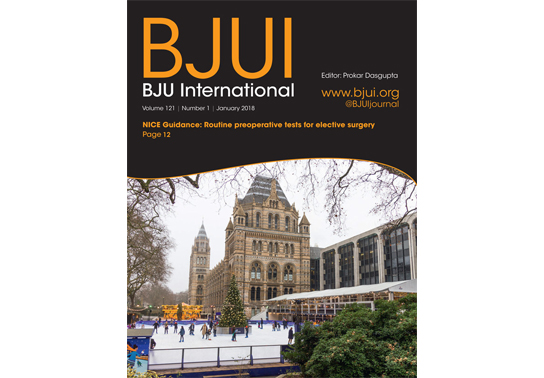Article of the Month: NICE Guidance – Routine preoperative tests for elective surgery
Every Month the Editor-in-Chief selects an Article of the Month from the current issue of BJUI. The abstract is reproduced below and you can click on the button to read the full article, which is freely available to all readers for at least 30 days from the time of this post.
In addition to the article itself, there is an accompanying editorial written by a prominent member of the urological community. This blog is intended to provoke comment and discussion and we invite you to use the comment tools at the bottom of each post to join the conversation.
If you only have time to read one article this week, it should be this one.
NICE Guidance – Routine preoperative tests for elective surgery
Overview
This guideline covers routine preoperative tests for people aged over 16 who are having elective surgery. It aims to reduce unnecessary testing by advising which tests to offer people before minor, intermediate and major or complex surgery, taking into account specific comorbidities (cardiovascular, renal and respiratory conditions and diabetes and obesity). It does not cover pregnant women or people having cardiothoracic procedures or neurosurgery.
Who is it for?
- Healthcare professionals
- People having elective surgery, their families and carers
This guideline updates and replaces NICE guideline CG3 (published June 2003).
Recommendations
People have the right to be involved in discussions and make informed decisions about their care, as described in your care [https://www.nice.org.uk/about/nice-communities/public-involvement/your-care].
We expect you to take our guidance into account. But you should always base decisions on the person you are working with.
Making decisions using NICE guidelines [https://www.nice.org.uk/about/what-we-do/our-programmes/nice-guidance/nice-guidelines/using-NICE-guidelines-to-make-decisions] explains how we use words to show the strength (or certainty) of our recommendations, and has information about prescribing medicines (including off-label use), professional guidelines, standards and laws (including on consent and mental capacity), and safeguarding.
Guidance on consent for young people aged 16–17 is available from the reference guide to consent for examination or treatment [https://www.gov.uk/government/publications/reference-guide-to-consent-for-examination-or-treatment-second-edition] (Department of Health).
The tests covered by this guideline are:
- chest X-ray
- echocardiography (resting)
- electrocardiography (ECG; resting)
- full blood count (haemoglobin, white blood cell count and platelet count)
- glycated haemoglobin (HbA1c) testing
- haemostasis tests
- kidney function (estimated glomerular filtration rate, electrolytes, creatinine and sometimes urea levels)
- lung function tests (spirometry, including peak expiratory flow rate, forced vital capacity and forced expiratory volume) and arterial blood gas analysis
- polysomnography
- pregnancy testing
- sickle cell disease/trait tests
- urine tests.
The recommendations were developed in relation to the following comorbidities:
- cardiovascular
- diabetes
- obesity
- renal
- respiratory.

